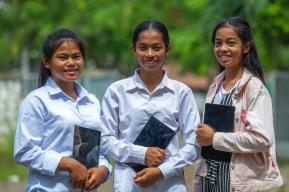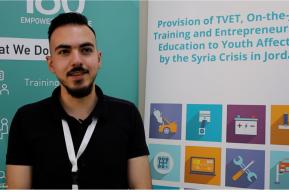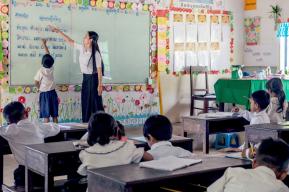Savorn Moeung, a literacy class teacher, sits next to the whiteboard of her classroom at Top Summit Garment, a bustling garment factory nestled in the industrial region of Phnom Penh, Cambodia. Here, amid the whir of sewing machines and scent of fabrics, Savorn had just finished the final class with a new batch of literacy learners at the factory under the Factory Literacy Programme (FLP-SkillsFuture) implemented by UNESCO and the Ministry of Education, Youth and Sport (MoEYS). Since 2017, 376 women factory workers with limited literacy have completed the programme and walked out of this classroom at the factory equipped with functional literacy and numeracy skills.
I am always happy and touched to see learners complete my literacy class. Some of them entered the class not knowing how to properly hold a pen, and they were able to confidently read and write after four months.
FLP-SkillsFuture is the flagship education programme of the MoEYS, supported by UNESCO, focusing on promoting literacy, skills development and gender equality. Implemented in partnership with industry partners, including the Textile, Apparel, Footwear & Travel Goods Association in Cambodia (TAFTAC) – the garment, footwear and travel goods (GFT) industry’s leading association – and employer factories, the programme provides a tailor-made literacy programme to equip garment factory workers, of which more than 95% are women, with functional literacy and numeracy skills to improve their reading, writing, critical thinking, work communications and performance. Furthermore, FLP-SkillsFuture recruits and trains literacy teachers within the partner factories to support the delivery of literacy classes.
From Factory Floors to Classroom Doors
Looking back to 2017, Savorn reminisces about the pivotal moment that marked the start of her journey as a literacy teacher. Back then, she worked as a needleworker in the sewing section. Born and raised in Prey Veng province, Savorn started to work in Top Summit after finishing high school. For her first three years with Top Summit, Savorn's warm-hearted nature and approachability earned trust and respect amongst her colleagues, where she volunteered to be a peer leader in delivering talks during her lunch breaks and break times on occupational safety and health education. Therefore, meeting the criteria of grade 12 completion and possessing profound familiarity with the workforce, her name was brought to the factory management team as the nominated literacy teacher entrusted to deliver and lead the class.
"Teacher" is a title that fills me with pride, but it also brings huge responsibilities. I was a worker myself; I keep telling myself that I do not want to disappoint my learners.

Transitioning into her new role was exciting yet challenging, Savorn shares, recalling the first year of her teaching when she had to juggle between her production duties and class preparations.
I have not done teaching before. At the beginning, I don’t know well the techniques of teaching and there was little time for preparing the class – I had to run between my production duties and literacy class teaching. It was also a big challenge for me too as the students are afraid of attending classes after not having been in school for many years.
The factory management team supported her with training on how to use software for lesson planning. Additionally, she participated in various capacity building workshops organized by UNESCO and the MoEYS to support literacy teachers like Savorn on the FLP -SkillsFuture teaching manual as well as student-centred pedagogies. Savorn shared about her experiences with the training of trainer workshop:
In the training workshop, every other teacher finished their bachelor’s degree, and I was the only one who did not attend university. Every minute at the workshop was precious for me. I learn from the trainer and other teachers. I made copy of all materials during the training and came back to study and study for it until late night.
With her dedication to her role as a literacy teacher, Savorn constantly reflects on how she can improve her teaching methods and teach more effectively. Her hard work bore fruit – she received the “Outstanding Literacy Teacher Award” from the MoEYS in her second year of teaching, as one of the two outstanding teachers nationwide. Furthermore, she was promoted from the production line to work in the administrative unit, which allows her to focus more on teaching.
From the Empowered to Empowering Others

Samoeun is a learner from Moeun’s class – her decision to re-enter classroom after leaving school twenty years ago at grade 2 to support her family, symbolizes a remarkable determination. Going back to learning was not easy for her, yet the desire to learn has motivated her to join the FLP-SkillsFuture literacy class.
It was difficult for me to remember anything taught in class because I have been out of school for so long. But our teacher Ms. Savorn was really supportive and patient. The class has many activities and games which made learning enjoyable.
Today, Samoeun has found renewed self-confidence – she is now able to write basic Khmer and perform calculations, enhancing her work performance and personal satisfaction.
I used to feel helpless and angry with myself, but now I am happy and more confident about myself. I am now able to write my own daily production report and understand the sewing machine instructions.

The FLP-SkillsFuture curriculum, grounded in practicality, resonates with the daily lives of workers. The literacy learner Samoeun said she found the content about fire prevention and hygiene particularly useful, which she regularly shares her newly learned knowledge with her family. In Savorn’s classroom, the atmosphere transcends conventional learning – it’s also about creating a nurturing community where learners feel supported and comfortable. “I always organize warm-up activities and use interactive games during teaching so that they can feel more connected and engaged.” Savorn always does her best to make the classroom suitable for fellow factory workers.
Nay, another student from Savorn’s class shared that her favourite activity of the class was a game called “balloon”, where learners are divided into groups which compete with one another by shouting out the words they had learned.
Because of the literacy class, I enjoy the commute from the factory to my home now. I look at the road signs and I can now read the numbers and letters on them. Even reading the words from the advertisement on a billboard brings joy.
Just like Samoeun and Nay, most of the enrolled learners at Top Summit Garment factory and thousands of FLP learners across the GFT factories shared similar educational backgrounds, having dropped out of school at the lower primary level. With the GFT sector employing more than 800,000 workers – nearly 10% of Cambodia’s labour force and predominantly women from rural areas with low education attainment, empowering these women through FLP-SkillsFuture has been crucial to improve their well-being and self-confidence, enhance their employability and life skills, and prepare them for the changing needs in the economy and society in the future.
As Savorn looks around her classroom, she sees more than the walls adorned with learning materials. She sees the resilience and determination etched on the faces of her learners – a testament to the transformative power of the FLP. Through this literacy programme, these women factory workers not only learn to read, write and calculate, but unlock doors to empowerment and self-confidence, reshaping their futures in the ways they once thought unimaginable, just like the journey of Savorn herself.
About FLP-SkillsFuture
The Factory Literacy Programme (FLP-SkillsFuture) is part of the second phase of the Decent Employment for Youth in Cambodia (DEY), a joint UN programme supported by the Swiss Agency for Development and Cooperation and UNESCO. In synergy with strategic partner Textile, Apparel, Footwear & Travel Goods Association in Cambodia (TAFTAC), FLP-SkillsFuture provides workplace-based classes to equip garment factory workers with functional literacy and numeracy skills to improve their reading, writing, critical thinking, work communications and performance. Participating garment factories provide both in-kind and financial support to support the implementation of FLP. Since its launch, more than 3100 workers, 95% of whom were women, have benefitted from the programme. Learn more.










